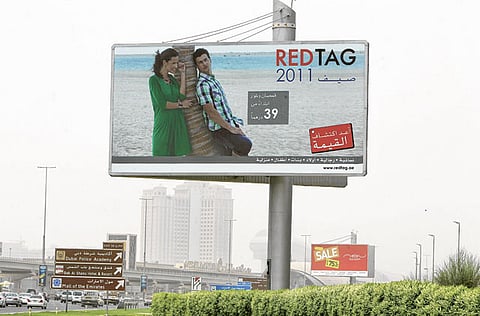Drop in sponsorship for Ramadan programmes hits ad industry
Some major shows barely have one sponsor, says media buyer

Abu Dhabi: After the global economic crisis of 2009 and the ongoing political turmoil in the Middle East and North Africa, the advertising industry in the region seems to be taking one hit after another as the ad spending continues to drop, according to industry experts.
"Though Ramadan always stands out from a calendar perspective, as well as from a cultural and religious perspective, you can never separate Ramadan from the happenings of the year and this year is no exception," said Kamal Dimachkie, Regional Managing Director at Leo Burnett.
Although the first quarter of 2011 witnessed a 20 per cent increase in terms of ad spending in the region compared to the same period last year, it gave false expectations for the rest of year as the second quarter got a beating with a 30 per cent drop, said Amir Al Hajj, regional buying director at VivaKi, which operates the media agencies Starcom MediaVest and Zenith Media.
"This is the worst year we've seen so far," Al Hajj said. "We're yet to see how this quarter is going to do."
Consumption behaviour
However, much of this decrease can be sensed by the regular viewer who knows what Ramadan programmes are usually like. For one, this month's programming is not as crowded as it was last year.
"Some [stations] used to have more than five series," he said. "Now it's an average of three per station."
Undoubtedly much of that is due to the fact that many of the major television series that are shown during Ramadan are shot in Egypt and Syria, two countries which are currently going through much political turmoil.
"A lot of programmes didn't make the market because they couldn't be done in time for Ramadan," Al Hajj said. This doesn't mean there won't be strong viewership this Ramadan.
Looking at people's consumption behaviour, "as the events in Egypt and Syria were unfolding and somewhere in between Libya, everyone was glued to the TV channels," Dimachkie said.
"Then the news became stale because you're seeing the same kind of news over and over again, so that allows people to shift their focus from what's happening around them.
"We see this happen whenever there's a regional crisis. These spikes will continue to happen but they can't be sustained over a long period of time. We're at the time that unless something new happens people are likely to go about their Ramadan in the usual way maybe a in a more contained way this year."
Another aspect is the number of sponsorships per programme happening this year.
"There is a great shortfall with Ramadan media investments this year with some major programmes barely having one sponsor," Al Hajj said. Last year you'd find five or six sponsors per programme; this year it's one sponsor per programme, he said. "It has never been the case."
And with fewer advertisers comes fewer budgets for the year.
Shaharyar Umar, Marketing Director at the Pan Arab Research Centre (PARC) in Dubai, told Gulf News that Egypt which had been the biggest advertising market in 2010, is today ranked fourth among the top spending markets.
"UAE regained its top spending position that it lost in 2010 to Egypt as it acted as region's safe hub and reported a flattened growth of one per cent during the period," Umar said.
"Saudi Arabia reported a growth of eight per cent that is highest among any regional market. Lebanon posted a three per cent increase in spending while Kuwait and Qatar reported three per cent each decline in measured spending. Bahrain advertising spending plunged by 22 per cent while Jordan posted 19 per cent decline," he said.
According to Al Hajj, the political instability is not the only factor behind the decline.
"There are a lot of reasons," he said. "Definitely the political situation; the economic pressure; the hit on the IT sector in Japan, and you know the local clients already have problems with their budgets."
Top ten in 2010
Zain, Stc, Mobily, Pepsi, Etisalat Egypt, Waqfa Masrya Ca., Chevrolet, Dabur, Pantene and Head & Shoulders.
Source: Pan Arab Research Centre



